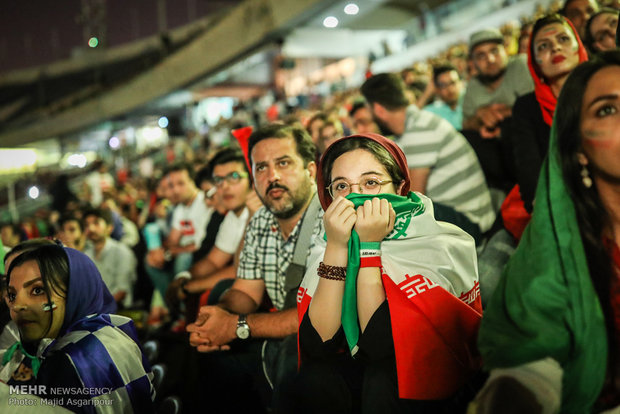The Persian version of this article has printed in “Goal” daily, Dated: Monday, June 12, 2017.
Open Stadium Doors to Families
From Azadi to Freedom
Vahid Namazi
It hasn’t been long since those days. A mere month cannot overpower our usually forgetful memory or erase those vivid images. During the heated presidential election campaigns, major candidates held rallies in stadiums and sports arenas across cities, big and small. In these events, noble and virtuous men and women of our beloved Iran, regardless of their political affiliations, came together in generally joyful and vibrant gatherings. Their collective presence led to one of the most magnificent elections in the country’s history. Among these moments, the attendance of women and girls in stadiums in Mashhad, Ahvaz, Shiraz, Sari, Bandar Abbas, and even the 12,000-capacity Azadi Arena in Tehran proved how their presence softens the atmosphere of such large gatherings. It effectively curbs the potential for rowdy behavior and verbal aggression often associated with male-dominated crowds. Although the ambiance of a political rally differs greatly from a sports event, the intense political fervor during the election period, coupled with the urge to challenge opposing factions and the stark differences in supporters’ preferences, could have inflamed tensions. Undoubtedly, the presence of women, along with their adherence to ethical conduct, prevented potential disruptions and maintained decorum across all political rallies.
Although women’s attendance at football stadiums was officially banned since the early 1980s, until just a few years ago, women enthusiastically attended volleyball, basketball, and other sports events in arenas. Their presence not only fulfilled their basic desire to watch sports but also contributed to a more refined atmosphere in these venues. The complete ban on women attending sports events was a clear injustice to half of society, which has always stood shoulder to shoulder with men in all spheres of life. Time and again, their presence has portrayed a progressive, modern, and respectable society, grounded in the preservation of essential Islamic values. The prohibition overlooked the reality that women eager to attend sports events were the same women and girls who are active in society every day—studying in universities, serving in parliament and city councils, working alongside men to earn a living, and raising the next generation. They are not from another land. They have repeatedly demonstrated their moral character, proving that their presence can significantly reduce the violent tendencies often seen in male behavior.
Now that the dust of the election campaigns and candidates’ slogans has settled, and thanks to pressure from the International Volleyball Federation, as well as efforts by the national federation, the Ministry of Sport, parliament members, and the media, the path has been paved for more women to attend World League volleyball matches. It is time for a “public and media campaign” to demand action from the honorable President, who previously promised greater female participation in stadiums during his heated election campaign. While the limited presence of women in the Azadi Arena for volleyball matches is a valuable step, it is far from sufficient. Although smoothing this challenging path requires patience, the solution of “facilitating family attendance” at stadiums can significantly expedite progress. This approach has proven effective in other countries. English stadiums, once overrun by unruly hooligans, have become far calmer and more family-friendly due to increased family attendance and restrictions on disruptive behavior. For us, who consider the family the cornerstone of an Islamic society, this can serve as a fitting model. By applying our societal values and the norms of our sacred faith, we can bring about a fundamental change in sports stadiums and the culture of spectatorship.

